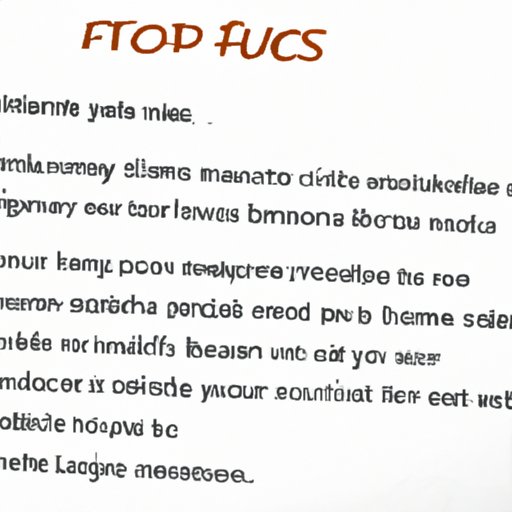Introduction: What is Forensic Science?
Forensic science is the application of scientific knowledge to the law. It involves the use of technology and analytical techniques to collect and analyze evidence from crime scenes in order to solve criminal cases. As such, it is an important field of study for those interested in pursuing a career in law enforcement or criminal justice.
The need for professionals with an understanding of forensic science is increasing as crime becomes more complex. A course in forensic science can provide students with a comprehensive overview of the fundamentals of the discipline and equip them with the skills and knowledge needed to succeed in this area.
Exploring the Core Concepts of Forensic Science
A course in forensic science will typically cover the basics of the subject, including the role of evidence in criminal investigations and how it can be used to identify suspects and establish guilt. Students will learn about the different types of evidence, such as fingerprints, DNA, ballistics, blood spatter, trace evidence and more. They will also gain an understanding of the importance of proper collection, handling and storage of evidence.
The course will also explore the legal aspects of forensic science, such as the admissibility of evidence in court and the ethical issues related to the use of forensic evidence. Students will learn about the rules of evidence, the role of expert witnesses, and other topics related to the criminal justice system.
The Benefits of Taking a Forensic Science Course
Taking a forensic science course can provide numerous benefits, including developing an understanding of the legal system, learning to analyze and evaluate evidence, and enhancing critical thinking skills. It can help students become more familiar with the principles and techniques used in criminal investigations and give them an insight into the way the criminal justice system works.
Students will also gain an understanding of the various technologies and techniques used in forensic science, such as lab analysis, autopsies, microscopy, DNA testing, and more. This knowledge can be invaluable for those considering a career in the field.
A Look at the Curriculum of a Forensic Science Course
A good forensic science course will cover a wide range of topics, from the fundamentals of forensic science to the latest developments in the field. The curriculum will typically include lectures, case studies, and hands-on laboratory work. Students may also have the opportunity to participate in field trips to crime scenes, laboratories, and other relevant locations.
The course may also include discussions on specific areas of forensic science, such as forensic biology, forensic chemistry, forensic anthropology, and forensic engineering. Additionally, some courses may offer electives on specialized topics, such as toxicology, pathology, and fraud examination.

What You Can Learn from a Forensic Science Course
By taking a forensic science course, students can gain an understanding of forensic principles and procedures, as well as knowledge of how to collect and analyze evidence. They will become familiar with the various technologies and techniques used in forensic science and learn to interpret results effectively. Additionally, they will develop critical thinking and problem-solving skills that are essential for success in the field.

Career Opportunities After Completing a Forensic Science Course
Upon completing a course in forensic science, graduates can pursue a variety of career opportunities. These include positions in law enforcement, laboratories or research institutions, and private industry. Some graduates may even choose to specialize in a particular area, such as DNA analysis, fingerprinting, or forensic accounting.
Those who complete a forensic science course can also pursue higher education in the field. There are many graduate programs available, such as master’s and doctoral degrees in forensic science. These can lead to more advanced positions in the field, including teaching, research, and consulting.

Tips for Choosing the Right Forensic Science Course
When selecting a forensic science course, it is important to do your research. You should examine the faculty credentials and experience of the instructors, as well as the course content and cost. Additionally, you should consider the time commitment required for the course and whether or not it fits into your schedule.
It is also important to look for courses that offer hands-on laboratory experience and field trips. These activities can provide valuable insight into the field of forensic science and help you develop the skills necessary to succeed in the field.
Conclusion: Why Take a Forensic Science Course?
Forensic science courses provide a comprehensive overview of the fundamentals of the discipline and equip students with the skills and knowledge needed to excel in the field. They can help students develop an understanding of the legal system, learn to analyze and evaluate evidence, and enhance critical thinking skills. Additionally, these courses can open up numerous career opportunities in law enforcement, laboratories, and private industry.
If you are interested in pursuing a career in forensic science, it is important to research and select the right course. By doing so, you can ensure that you receive quality instruction and gain the skills and knowledge necessary to succeed in this exciting field.
(Note: Is this article not meeting your expectations? Do you have knowledge or insights to share? Unlock new opportunities and expand your reach by joining our authors team. Click Registration to join us and share your expertise with our readers.)
